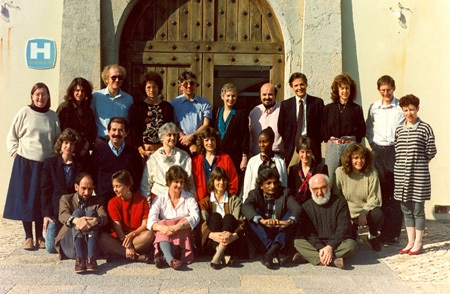Analysis in Medical Anthropology
Date
Mar 5-13, 1988Organized by
Shirley Lindenbaum and Margaret LockLocation
Hotel do Guincho, Cascais, PortugalPublications
Knowledge, Power and Practice (Shirley Lindenbaum and Margaret Lock, Eds.) University of California Press, 1993.Participants
- George Armelagos University of Massachusetts, USA
- Roberto Briceño-Leon Universidad Central de Venezuela
- Jean Comaroff University of Chicago, USA
- Sue Estroff Univeristy of North Carolina, USA
- Horacio Fabrega, Jr. University of Pittsburgh, USA
- Ronald Frankenberg University of Keele, UK
- Byron J. Good Harvard University, USA
- Donna Haraway University of California, Santa Cruz, USA
- Roger Jeffery University of Edinburgh, UK
- Patricia Kaufert University of Manitoba, Canada
- Shirley Lindenbaum New School for Social Research, USA
- Margaret Lock McGill University, Canada
- Diana Long College of Physicians, Philadelphia, USA
- Gananath Obeyesekere Princeton University, USA
- Tola Olu Pearce Obafemi Awolowo University, Nigeria
- Lorna Amarasingham Rhodes University of Washington, USA
- Nancy Scheper-Hughes Univeristy of California, Berkeley, USA
- Sydel Silverman Wenner-Gren Foundation, USA
- Nicole Sindzingre Centre National de la Recherche Scientifique, France
- Pamela Smith Pace University, USA
- Peter Wright Portsmouth Polytechnic, UK
- Allan Young Case Western Reserve University, USA
ORGANIZER’S STATEMENT: This symposium brought together an international group of scholars from the fields of anthropology, biology, sociology, and history whose work is at the forefront of the emerging field of medical anthropology. The aims of the conference were (1) to reflect upon the historical development of medical anthropology and to consider the directions in which it is currently headed, and (2) to seek links among domains of inquiry generally treated separately – biology, social context, and symbolism. Drawing on a series of case studies dealing with illness, medical knowledge, and the body, the discussions problematized such key notions as the self, sex, reproduction, race, and disease and sought new ways of conceptualizing the relationship between biology and culture.
Wenner-Gren Symposium #106
